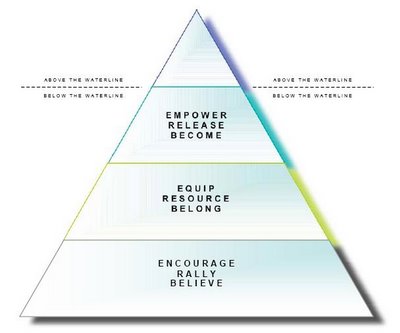Friday, May 19, 2006
On Attitudes and Excellence (by Charles Swindoll)
 I feel compelled to share this piece of advice, which I've carried around with me for over 20 years:
I feel compelled to share this piece of advice, which I've carried around with me for over 20 years:“The longer I live, the more I realize the impact of attitude on life.
Attitude, to me is more important than facts. It is more important than the past, than education, than money, than circumstances, than failures, than successes, than what other people think or say or do.
It is more important than appearance, giftedness or skill.
It will make or break a company ...a church ...a home.
The remarkable thing is we have a choice everyday regarding the attitude we will embrace for that day.
We cannot change our past ...we cannot change the fact that people will act in a certain way. We cannot change the inevitable.
The only thing we can do is play on the one string we have, and that is our attitude.
I am convinced that life is 10% what happens to me and 90% how I react to it.
And so it is with you ...we are in charge of our attitudes.”
Bill Swanson's Unwritten Rules of Management
Zalig gratis boekje met tips allerhande over hoe te functioneren in een bedrijf, organisatie of kerk.
 William Swanson, Chairman and CEO of Raytheon Corporation, spent his entire career at Raytheon, and was later asked if he could put his rules down on paper. So he did: in 3-inch-by-5-inch spiral-bound notebooks handed out to executives and customers.
William Swanson, Chairman and CEO of Raytheon Corporation, spent his entire career at Raytheon, and was later asked if he could put his rules down on paper. So he did: in 3-inch-by-5-inch spiral-bound notebooks handed out to executives and customers.
For those of you who haven't seen them, here they are for your review:
1. Learn to say, "I don't know." If used when appropriate, it will be used often.
2. It is easier to get into something than it is to get out of it.
3. If you are not criticized, you may not be doing much.
4. Look for what is missing. Many know how to improve what's there, but few can see what isn't there.
5. Viewgraph rule: When something appears on a viewgraph (an overhead transparency), assume the world knows about it, and deal with it accordingly.
6. Work for a boss with whom you are comfortable telling it like it is. Remember that you can't pick your relatives, but you can pick your boss.
7. Constantly review developments to make sure that the actual benefits are what they are supposed to be. Avoid Newton's Law.
8. However menial and trivial your early assignments may appear, give them your best efforts.
9. Persistence or tenacity is the disposition to persevere in spite of difficulties, discouragement, or indifference. Don't be known as a good starter but a poor finisher.
10. In completing a project, don't wait for others; go after them, and make sure it gets done.
11. Confirm your instructions and the commitments of others in writing. Don't assume it will get done!
12. Don't be timid; speak up. Express yourself, and promote your ideas.
13. Practice shows that those who speak the most knowingly and confidently often end up with the assignment to get it done.
14. Strive for brevity and clarity in oral and written reports.
15. Be extremely careful of the accuracy of your statements.
16. Don't overlook the fact that you are working for a boss.* Keep him or her informed. Avoid surprises!* Whatever the boss wants takes top priority.
17. Promises, schedules, and estimates are important instruments in a well-ordered business.* You must make promises. Don't lean on the often-used phrase, "I can't estimate it because it depends upon many uncertain factors."
18. Never direct a complaint to the top. A serious offense is to "cc" a person's boss.
19. When dealing with outsiders, remember that you represent the company. Be careful of your commitments.
20. Cultivate the habit of "boiling matters down" to the simplest terms. An elevator speech is the best way.
21. Don't get excited in engineering emergencies. Keep your feet on the ground.
22. Cultivate the habit of making quick, clean-cut decisions.
23. When making decisions, the pros are much easier to deal with than the cons. Your boss wants to see the cons also.
24. Don't ever lose your sense of humor.
25. Have fun at what you do. It will reflect in your work. No one likes a grump except another grump.
Article: The Ethical Revolution (www.allfor1.com)
We are faced with a thousand choices everyday. Some choices are big. Should I date that person? Do I want to go to college? What do I believe about God?
Some choices are small. Coke or Pepsi? Where do I want to eat lunch? Am I going to take a shower today or not? (maybe that one’s a big decision…)
Many of our choices will affect other people. It’s said, “It doesn’t matter what you do, as long as it doesn’t hurt anyone.” But can you really know what hurts and what doesn’t? How do you know where to draw the line?
Ethics help you draw the line. Ethics are choices that lead to positive outcomes for everyone. Some people base their decisions on what they can get out of life; others understand that their choices affect other people, too. Ethics go beyond what’s right or wrong; beyond what’s legal or illegal. Ethics are choices that are good for everyone.
Ethical decisions have two parts. First, you have to draw the line (decide where your boundaries are on an issue). Second, you have to walk the line (maintain those boundaries).
Once you’ve drawn the line, make your commitment public. Make a pledge and let the revolution begin. Ethical living isn’t just measured by an impassioned speech, or a decision made at a rally, it’s measured by endurance. It’s standing for what you believe over time.
Wednesday, May 17, 2006
Article: The all for one pyramid (www.allfor1.org)
The majority of an iceberg cannot be seen as 90% of its mass lies below the waterline. The unseen share is actually what forms the shape that is visible. In reality, if the structure below the waterline falls apart, the 10% that is noticed fails to exist.
Over the last few decades, the church has placed more emphasis on the seen than the unseen. Success has been measured more by how well youth ministry was prepared, programmed, and presented since those areas tend to be tangible and easier to quantify. As a result, the efforts needed to produce youth in ministry have severely suffered as the context of youth in ministry gave way to content for youth ministry.
The following diagram is based upon Luke 5:1-11 and describes how the All for One principles apply to producing youth in ministry.
---------
ABOVE the waterline is where young leaders spend their time in ministry.
ABOVE the waterline includes: prepare, program, and present. Those items are reserved exclusively to be done to youth, for youth, and by youth.
 BELOW the waterline is where adult leaders spend their time in ministry.
BELOW the waterline is where adult leaders spend their time in ministry. BELOW the waterline includes: equip, encourage, and empower, rally, resource, and release, and believe, belong, and become. These principles go beyond the surface of the situation to the real depth of discipleship.
BELOW the waterline might be what Jesus is talking about when He tells His disciples to “Put out into deep water, and let down the nets for a catch.” (Luke 5:3-5).
BELOW the waterline takes great effort but also reaps the real reward for which Jesus has called us to fish.
BELOW the waterline produces the “catch” Jesus intended and requires a greater effort by a larger team of committed adult leaders.
---------
As young people step forward to make plans and lead kingdom causes, adults work behind the scenes to make sure they are truly cared for and set up for greater success as youth in ministry. The “tip of the iceberg” for people to see is a generation of youth learning life in community, discovering their unique role in ministry, and transforming their world for Jesus Christ.
Zin
Tuesday, May 16, 2006
Article: from the field (by david nelson)
“The volunteers are more important than the people they serve.” This quote has recently challenged and changed the way I do ministry as a youth pastor. It’s not that the students aren’t important because they are; it’s just that if I was going to prioritize them and my volunteer staff, the volunteers needed to come first in my heart, passion, and actions.
This quote is revolutionary for me because I got into youth ministry so I do what I enjoy most, which is hang out with students. But this would mean changing my thinking and now focusing on volunteers instead of kids. I haven’t cut myself off from interaction with students, it’s just now I spend way more time and energy reaching out to and ministering to my volunteer staff then ever before.
A specific way that I’ve applied this every year is by having a getaway with my whole team up to a large cabin in Lake Arrowhead for a weekend. For 2 and half days there is no agenda. The dozen or so of us just simply hang out and bond over meals, card games, and walks around the area. No ministry planning, vision casting or training. Just simply spending unrushed, uninterrupted time with each other. Now I purposely and actively sought out certain staff that I knew I needed to catch up on and encourage or challenge them in a certain way, but as far as they all new, I had basically created a vacation for everyone. And they loved it.
My team now feels so much more connected than ever before and also just have a lot more fun together. And that is contagious. In my opinion, this one key twice a year getaway helped our staff grow numerically and in longevity in their commitment. It’s bred loyalty. And this has greatly blessed our ministry to the students. Because by me being passionate about my team staff and they really sensing and seeing it, it’s made them equally passionate about each other and the students. The trickle down effect has been cool to watch. I’ve had students remark, “Wow, you guys genuinely like each other huh!”
And that has been a proud moment that’s carried a lot of momentum for our whole ministry.
David Nelson
Seacoast Community Church
Article: Communication - A Key to Warmth in Marriage (by Jim Burns)
 The trait that is most closely linked to the success or failure of your marriage is your ability to communicate. Sometimes in youth ministry marriages, we develop some very poor communication habits.
The trait that is most closely linked to the success or failure of your marriage is your ability to communicate. Sometimes in youth ministry marriages, we develop some very poor communication habits.Dr. John Gottman is one of the world’s leading experts on marriage. He claims that he often can determine if a couple is on the road to divorce by observing them interact on an issue of conflict. Much of Dr. Gottman’s finding centers around the use of negativity as poor communication. In his excellent book, The Seven Principles for Making Marriage Work, he writes about six poor habits of communication that are detrimental to building intimacy and developing healthy communication. (These poor habits will help you measure how you are doing with your spouse in this area. If you find yourself needing help, then I suggest you talk with someone about your communication. Remember, where there is no counsel, people fall; in the multitude of counselors, there is safety.) Dr. Gottman’s six poor communication habits are:
1. Harsh Start ups
2. The Four Horsemen: criticism, contempt, defensiveness, stonewalling
3. Flooding
4. Body Language
5. Failed Repair Attempts
6. Bad Memories
Let me explain in my own words the dynamics behind these habits of poor communication. I think, like me, you will see yourself in many of them.
1. Harsh Start Ups: Harsh start ups put the other person in the defensive before the conversation has a chance.
2. The Four Horsemen: Dr. Gottman claims that certain types of negativity are more lethal to your relationship. His four horsemen are 1) Criticism: Complaints are normal but criticism deals more with your spouse’s character and personality. 2) Contempt: This is long simmering negative thoughts about your partner that turn into disrespect. 3) Defensiveness: As we discussed earlier in the chapter this approach rarely ever works and usually turns the conversation into a blame game. 4) Stonewalling: Eventually your partner tunes you out. Raymond wasn’t willing to work at communication with Sylvia; he simply crawled into his cave and the conversation stopped for the time being.
3. Flooding: This happens when you or your spouse bombards the communication with negativity whether it is in the form of criticism, contempt, defensiveness or any other negative approach. Some people would call consistent nagging a form of flooding. One man told me that when his wife starts flooding and nagging at him, he feels like she is taking her hand and just tapping on his chest until he blows up.
4. Body Language: Authorities tell us that good communication is more about body language than actual words. When a person shuts the other person out with their body language, usually the healthy communication is over. Literally sometimes their body language is evident that they have quit listening. It is too difficult to stay that intense.
5. Failed Repair Attempts: A repair attempt is when a couple puts the brakes on the tension in the relationship and deescalates the conversation. Obviously there are times with intense communication where a couple needs to take a timeout. In a relationship that isn’t working, a failed repair attempt doesn’t work at decreasing the tension or lowering the stress level. Constant failed repair attempts are like that stress fracture that just keeps getting worse.
6. Bad Memories: When a couple is consumed with negativity it not only affects their past but it can place danger on their future. In almost all cases there are very good and happy memories in every relationship but if things are too negative that they can’t remember the good times, the relationship is deteriorating.
These are all bad habits, but quite normal. If you are struggling in the communication department of your marriage, then I strongly suggest you get the help you need to work out the communication issues. Next time, I will write about what you can do to enhance the communication in your marriage.
Look for Jim’s new book, Creating an Intimate Marriage
Jim Burns
HomeWord.com




